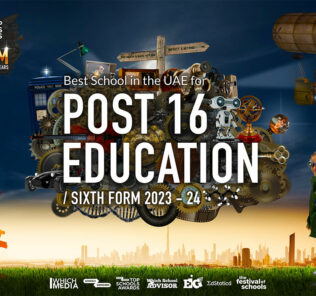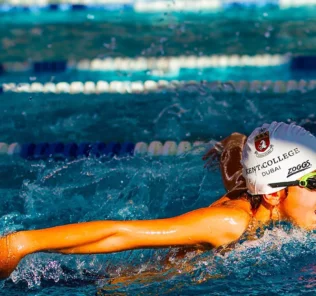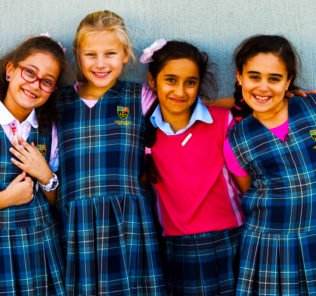Canadian High School Diploma GUIDE
Like its US counterpart, one of the challenges for prospective parents in understanding the Canadian High School Diploma system is the lack of consistency in its awarding and teaching between provinces. There is, to all intents and purposes, no single Canadian High School Diploma. As Shawn Merke, Founding Principal of the British Columbia Canadian School, currently under construction in Dubai Investments Park, told our sister site whichschooladvisor: “Education in Canada is developed by each individual province. As such there is no standard Canadian curriculum.”
It is, frustratingly for parents given the complexity, instead necessary to look at Canadian High School Diplomas, and their related qualifications, in the context of individual awarding bodies. In the UAE this is the Alberta High School Diploma, as awarded in the Abu Dhabi based Canadian International School, the Ontario High (Secondary) School Diploma awarded in the relatively new (2014) KG-Grade 8 only Ontario International Canadian School in Dubai (which will eventually phase launch to full Grade 12 provision), the Nova Scotia (Graduation) High School Diploma, awarded by the Abu Dhabi Grammar School and, as above, the British Columbia Canadian High School Diploma to be awarded by the British Columbia Canadian School launching in Dubai.
The four provinces award diploma’s in completely different ways with different assessments, teaching methodologies and course structures.
Of these many differences, arguably the most important for prospective parents is the very different approach to external accreditation and the role examinations of in qualifying student’s grades.
Alberta and Quebec are the only two provinces in Canada that require high school students to write provincial wide exams. As a result, it is argued, they are the only awarding bodies able to offer consistency, and avoid the grade inflation risks of coursework marked internally.
The Alberta Diploma Exams make up are thirty percent of the course grade for thirty-level subjects. Subjects include English 30-1 or 30-2, Social Studies 30-1 or 30-2, and one or more approved 30-level Science courses, including Biology, Chemistry, or Physics. Grade 11 Mathematics is also required but other Grade 11 courses are not examined.
The result is that grade averages for Alberta and Quebec students tend to be lower than those of alternative state curricular, and their resulting Diplomas – including Ontario and Nova Scotia.
It is worth quoting Shawn Merke on the British Columbia approach in full:
“The British Columbia education system does not conform to an exam system that is centered on standardised tests, but on assignments, projects and provincial tests that are authentic assessments written by educators. In grade 12, provincial exams are taken which are marked by teachers in British Columbia and our students will be graded at the same level as all other students in British Columbia.
As part of our ethos of inclusion, we cannot expect all of our students to display their knowledge and capabilities to their true potential in one single way. Within our student-driven curriculum, students are afforded the opportunity to exhibit their abilities in multiple ways. Applying a multi-faceted approach to assessment does not take away the academic rigour, nor does it give false results. It in fact gives a true assessment of what our students can do, as it applies to real-world contexts.”
This approach will strike a chord in parents of children in the UK system who have seen this sort of argument rage in the many changes to the English National Curriculum which has seen play out a battle between grading based on coursework and examinations. As it stands today, that battle has been decided in favour of a return, in toto, to examinations and away from the more liberal and inclusive approach adopted by British Columbia, this in no small part because of the perceived risks of “dumbing down”, grade inflation and the negative impact of these on the credibility of IGCSE awards in particular.
We have provided further information below, but such is the inconsistency and complexity, parents will face a significant struggle in weighing up the benefits – and overall value of a Canadian education, for their individual child(ren) – and the strengths and weaknesses of each curricula.
We do strike a note of caution. Like the US High School Diploma, there may well be serious issues for students seeking to leverage a High School Diploma alone to enter universities worldwide for undergraduate rather than foundation study.
At the University of Cambridge, for example, in the UK, the Canadian High School Diploma/Secondary School Diploma “is not sufficient on its own to make a competitive application.”
This applies too to Québec CEGEP students and those from Alberta too, notwithstanding their arguably more academic foundations over alternative curricular.
Instead, increasingly we recommend that both Canadian and US students must sit for five College Board Advanced Placement (AP) Tests, OR three International Baccalaureate Higher Level subjects, in relevant subjects to the proposed course of undergraduate study. This must be in addition to passing the High School Diploma with high scoring in all papers.
This is explained in part by noting that Universities in Canada, for example, generally have much lower admissions requirements than equivalent UK universities. For example, the University of Alberta will accept only two International AS Levels (arguably representing less than half of a full International A Level each) and 3 IGCSEs to qualify an applicant for entry.
Parents should also be aware that the lesser qualifications awarded within Canadian schools to those students who do not complete the High School Diploma, namely the Certificate of Achievement or a Certificate of High School Achievement, are not generally weighted at all outside Canadian Universities.
Because the Ontario International Canadian School is currently in phased launch to only Grade 8, it has not been possible to identify what, if any, provision for AP subject study will be provided by the school. Neither the International Canadian School, or Abu Dhabi Grammar School, currently integrate AP study within their curriculum.
We understand that the British Columbia Canadian School in Dubai will offer AP course provision as standard, initially in European History, Biology, Physics, Chemistry and Micro economics. Whilst we would hope that AP options will extend beyond this, if this is the case when the school launches it will set a new, and very important, benchmark, for effective Canadian school education in the Emirates.
The decision not to offer students integrated AP study by all other Canadian schools currently, sets the Canadian schools apart from many Tier 1 US schools in the Emirates. In these schools it is now recognised that AP study is a necessary supplement to the High School Diploma for its students if they are to keep parity with students from other students in alternative schools graduating at the same time.
We, and our sister site WhichSchoolAdvisor.com, believe that parents should be aware of the integral and serious risks of US or Canadian schooling for students, however otherwise outstanding it may be, if it does not include parallel stream AP, IB or International A Level study.
Canada
There are more than 250 school boards in Canada. Of these, New Brunswick, Manitoba, British Columbia, Nova Scotia, Ontario, Alberta and Prince Edward Island currently underwrite/accredit Canadian schools worldwide.
The world's most widely adopted accrediting principality is Ontario.
The Emirates currently has High School Certificates underwritten by:
Nova Scotia Department of Education and Early Childhood Development [NS EECD]
Ontario Ministry of Education [OME]
Alberta Education [AE]
High school generally comprises education through Grade 9 (ages 14–15); Grade 10 (ages 15–16); Grade 11 (ages 16–17); and, Grade 12 (ages 17–18), although a High School Diploma (or equivalent) cannot be awarded without full KG-Grade 12 schooling (Grade 11 in Quebec).
The Diploma is awarded on the basis of work completed over the three year, 1000 plus hours, Senior High School programme between Grade 10 and Grade 12. Students may complete senior high school with an High School Diploma, Certificate of Achievement or a Certificate of High School Achievement, or alternative Board equivalents.
Not consistent by subject, breadth, depth of study or year.
Under the Alberta programme in Years 11 - 12 students study:
English Language Arts (Core)
Mathematics (Core)
Science (Core)
Social Studies (Core)
Physical Education (Core)
Calm (Career and Life Management) (Core)
with options drawn from:
Off Campus Programmes
Locally developed courses
Aboriginal Studies
Fine Arts
Physical Education
Social Sciences
Career and Technology Studies (CTS)
Health, Recreation & Human Services (HRH) (French)
Media, Design & Communication Arts (MDC) (French)
Natural Resources (NAT) (French)
International Languages
Italian Language and Culture (Twelve-year Program)
Mathematics 20-1, 20-2, 20-3 (English and French)
Chinese Language and Culture (Nine-year Program)
German Language and Culture (Nine-year Program)
Japanese Language and Culture (Nine-year Program)
Punjabi Language and Culture (Nine-year Program)
Punjabi Language and Culture (Three-year Program)
Spanish Language and Culture (Nine-year Program)
Ukrainian Language and Culture (Nine-year Program)
Mathematics 30-1, 30-2, 30-3 (English and French)
To earn an Alberta High School Diploma, students must complete a programme of courses and earn a minimum of 100 "credits", of which half are earned through core subjects and half through electives.
Under the Ontario programme, to graduate students must achieve:
4 credits in English (1 credit per grade)*
3 credits in Mathematics (1 credit in Grade 11 or 12)
2 credits in Science
1 credit in Canadian history
1 credit in Canadian geography
1 credit in the Arts
1 credit in health and physical education
1 credit in French as a second language
0.5 credit in career studies
0.5 credit in civics
Plus one credit from each of the following groups:
Group 1:
English or French as a second language
A Native language
A classical or an international language
Social sciences and the humanities
Canadian and world studies
Guidance and career education
Co-operative education***
Group 2:
Health and physical education
The arts
Business studies
French as a second language
Cooperative education
Group 3:
Science (Grade 11 or 12)
Technological education
French as a second language
Computer studies
Cooperative education
In addition to the compulsory credits, students must complete:
12 optional credits
40 hours of community involvement activities
Any local literacy requirement
Under the Nova Scotia programme students must earn a minimum of 18 credits including a maximum of 7 Grade 10 credits and a minimum of 5 Grade 12 credits in the following:
3 x English Language
1 x Fine Arts
2 x Mathematics
2 x Sciences
2 from either Mathematics, Science or Technology
1 x Physically Active Lifestyle/ Physical Education
1 x Canadian History
1 x Global History
Locally available courses at AGS are:
English, Mathematics, Science, History, Biology, Canadian History, Advanced Mathematics, Global History, Communication, Physics, Economics, Advanced Mathematics, Pre-Calculus, Chemistry 11, Calculus, Art, PAL / PE, Arabic, Islamic Studies, Dance, French, Drama, Music
In the Alberta prgramme approximately 70% coursework:30% externally accredited examinations
In other programmes there is no specified ratio and examinations are generally not externally accredited.
Excepting the Alberta (and Quebec) variant(s), arguably significantly less than alternative international curricular - BUT this is highly dependent on the school.
Alberta judged more difficult, but highly dependent on the school. The curriculum will present significantly less challenges than the International O Level to most students given its prioritisation/weighting of examinations in most subjects.
Widely available, although in the Emirates there are generally less available third party support materials than with alternative curricula
Again, there is a lack of cohesion.
Alberta awards the Alberta High School Diploma
Ontario awards the Ontario Secondary School Diploma
Nova Scotia awards the High School Graduation Diploma of Nova Scotia
Grades are generally classified only by the points required to meet passing the Diploma.
Mixed mid-tier to premium:
19,000 AED - 41,000 AED
CIS: 35,000 AED - 47,000 AED
OICS: 31,000 - 63,000 AED (currently Year 8) - expected to rise to 70,000 AED at full phase
Given the lack of consistency, differences between subject offers, grading differences and lack of unifying teaching methodology, and alternative year timings we do not recommend transferring between Canadian schools or between alternative international curricular schools.
In isolation, we have some concerns about the breadth of options actually open for students given the uniform lack of AP provision. The Canadian University in Dubai will accept the High School Diploma for undergraduate study, as will a number of universities in Canada. There is no definitive guarantee however outside these obvious slipstreams and further AP (or IB/ International A Level) study both may be required, or would certainly open up the broadest range of undergraduate options, particularly in Europe.
Hard to generalise because both Canadian and US curricular are very highly dependent on their quality of delivery on the school delivering it. Technically, in the best schools, the curricular is extremely inclusive and inspirational, stretching the most gifted and offering high added value to mixed and weaker ability children. There is significantly less subject specialism than in the English National Curriculum schools, both to IGCSE and certainly International Al Level. At its best, it is arguable that Canadian schooling shares much in common with the IBMYP - but it offers far less guarantees in the quality of provision.
Parents MUST dig deep into researching each Canadian school and cannot rely on the curriculum, or a generalisation about Canadian schooling as a whole, to any degree in guaranteeing quality of provision, or indeed a good "fit" for their child(ren).
Poor outside Canada and to a lesser degree the US - certainly the qualification has significantly less international currency than its UK or Swiss counterparts - or the German matura. Arguably it needs to be supplanted by degree level study - and then its value re-balances as a mechanism to guarantee basic competency in English and/or Mathematics, particularly where these are not studied at undergraduate level.
The core challenge faced by the qualification, in part because of the lack of consistency of its provision and design between awarding provinces, is global perception that it relates nearer to an age 16 qualification, than age 18. The end result is that students risk leaving school with a qualification at odds with the age of the child relative to children who have studied, for example, the IB Diploma or International A Levels. This is why we, and our sister site whichschooladvisor, very strongly recommend that parents look for schools that run parallel supplemental AP, IB or International A Level programmes to be awarded with the Diploma. As it stands in the Emirates, these are available as standard in (the best) US curriculum schools only and parents committed to a Canadian education face later compromising their children's ability to the broadest range of undergraduate (and industry) options.
Again, outside the US and Canada, very limited. Arguably, the US and Canadian educational systems are premised on children being required to attend university - but with limited options as to the universities which will accept the High School Diploma as a pre-qualifier.
Weak without being supplemented by AP, IB or International A Level qualifications.
• At its best, a fabulously rich curriculum with schools being given significant levels of autonomy in developing courses to meet the cultural, ability and talents of individual children
• Provides a cultural Canadian context that other schools cannot match
• Recognition within Canada and the US
• Slipstream to the Canadian University of Dubai
• Excellent WSA feedback for the Canadian International School
• Serious concerns about the value of the Canadian High School Diploma across all provincial accrediting bodies when studied in isolation
• No dedicated AP provision, unlike in Tier 1 US schools
• Potential for Canadian school leavers being locked out from European university slipstreams except to foundation programmes
• Many students will face up to two year extra higher educational study for the AP, International A Level or IB Diploma courses to catch up with school leavers from alternative curricular
• Huge dependence on schools to actually deliver with hands-off accreditation by the provinces and school led qualification and delivery









































































Leave a Response